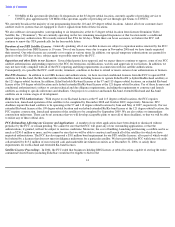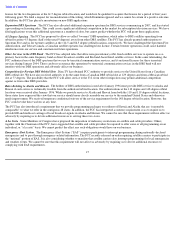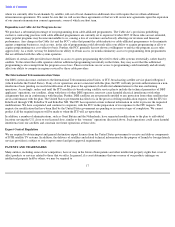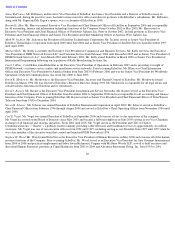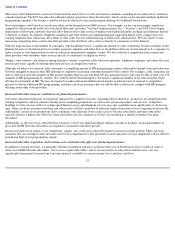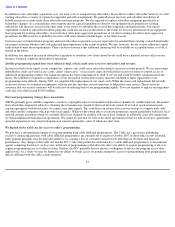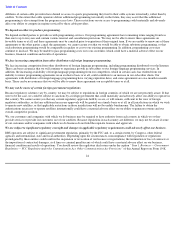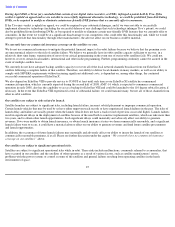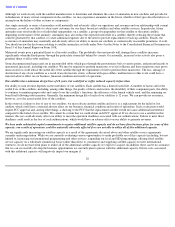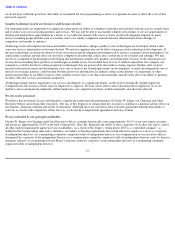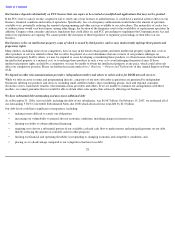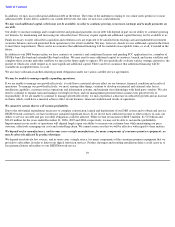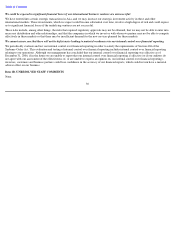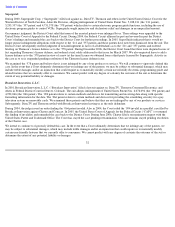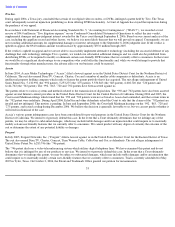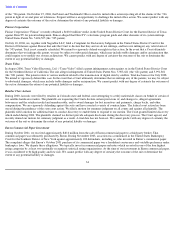Dish Network 2007 Annual Report Download - page 31
Download and view the complete annual report
Please find page 31 of the 2007 Dish Network annual report below. You can navigate through the pages in the report by either clicking on the pages listed below, or by using the keyword search tool below to find specific information within the annual report.
Table of Contents
Affiliates of certain cable providers have denied us access to sports programming they feed to their cable systems terrestrially, rather than by
satellite. To the extent that cable operators deliver additional programming terrestrially in the future, they may assert that this additional
programming is also exempt from the program access laws. These restrictions on our access to programming could materially and adversely
affect our ability to compete in regions serviced by these cable providers.
We depend on others to produce programming.
We depend on third parties to provide us with programming services. Our programming agreements have remaining terms ranging from less
than one to up to ten years and contain various renewal and cancellation provisions. We may not be able to renew these agreements on
favorable terms or at all, and these agreements may be canceled prior to expiration of their original term. If we are unable to renew any of these
agreements or the other parties cancel the agreements, we cannot assure you that we would be able to obtain substitute programming, or that
such substitute programming would be comparable in quality or cost to our existing programming. In addition, programming costs may
continue to increase. We may be unable to pass programming costs on to our customers which could have a material adverse effect on our
business, financial condition and results of operations.
We face increasing competition from other distributors of foreign language programming.
We face increasing competition from other distributors of foreign language programming, including programming distributed over the Internet.
There can be no assurance that we will continue to experience growth in subscribers to our foreign-language programming services. In
addition, the increasing availability of foreign language programming from our competitors, which in certain cases has resulted from our
inability to renew programming agreements on an exclusive basis or at all, could contribute to an increase in our subscriber churn. Our
agreements with distributors of foreign language programming have varying expiration dates, and some agreements are on a month-to-month
basis. There can be no assurance that we will be able to renew these agreements on acceptable terms or at all.
We may not be aware of certain foreign government regulations.
Because regulatory schemes vary by country, we may be subject to regulations in foreign countries of which we are not presently aware. If that
were to be the case, we could be subject to sanctions by a foreign government that could materially and adversely affect our ability to operate in
that country. We cannot assure you that any current regulatory approvals held by us are, or will remain, sufficient in the view of foreign
regulatory authorities, or that any additional necessary approvals will be granted on a timely basis or at all, in all jurisdictions in which we wish
to operate new satellites, or that applicable restrictions in those jurisdictions will not be unduly burdensome. The failure to obtain the
authorizations necessary to operate satellites internationally could have a material adverse effect on our ability to generate revenue and our
overall competitive position.
We, our customers and companies with which we do business may be required to have authority from each country in which we or they
provide services or provide our customers use of our satellites. Because regulations in each country are different, we may not be aware if some
of our customers and/or companies with which we do business do not hold the requisite licenses and approvals.
We are subject to significant regulatory oversight and changes in applicable regulatory requirements could adversely affect our business.
DBS operators are subject to significant government regulation, primarily by the FCC and, to a certain extent, by Congress, other federal
agencies and international, state and local authorities. Depending upon the circumstances, noncompliance with legislation or regulations
promulgated by these entities could result in the suspension or revocation of our licenses or registrations, the termination or loss of contracts or
the imposition of contractual damages, civil fines or criminal penalties any of which could have a material adverse effect on our business,
financial condition and results of operations. You should review the regulatory disclosures under the caption “ Item 1. Business — Government
Regulation
— FCC Regulation under the Communication Act, Other Communications Act Provisions” of this Annual Report on Form 10-K.
24


